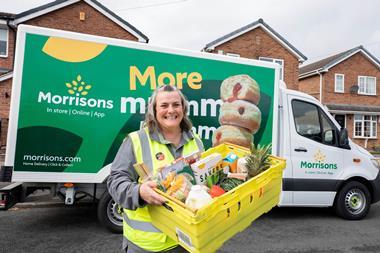Winner or loser, the price of entering Safeway's bidding war will be a multi-million pound bill. Glynn Davis reveals where the money goes
While the outcome of the bid battle for Safeway remains unknown, what is a racing certainty is that the bidders involved in the five-way tussle will be landed with an immense bill from their advisers at the end of the day. Between the four supermarkets involved, some industry commentators estimate that the final bill is likely to top £75m, but others reckon this could be a conservative estimate and the total could double that, to £150m. Mark Hughes, food analyst at Numis, believes that if the winner is a supermarket, it could face a total bill of £60m factoring in advice on disposals.
With a phalanx of investment bankers, lawyers, corporate brokers and financial PR executives involved, no wonder costs can spiral out of control. For each supermarket including Safeway there is likely to be a core team of between 20 and 25 people working full-time on the deal. Including support staff, the number could almost run into hundreds.
One PR executive representing one of the bidding supermarkets says the £27.7m bill expected by the cost-conscious Morrisons as listed in its offer document is significantly less than the norm. It should be noted that nearly half of this is Stamp duty, but it still has to come from shareholders' funds.
Bradford-based Morrisons is even cannier because it will more than cover these costs if its bid fails because its break-clause' of £30m would kick-in if Safeway breaks its original agreed deal.
Another senior financial PR executive says the other supermarkets could be facing a bill 30%-40% higher than Morrisons, which would take their total to around £40m. A large portion of this will go to the investment bankers who take into account the bid price, the time involved and the complexity of the deal to calculate their fee. Hughes says you need bankers who "have the capacity and can move quickly, and this costs money".
They will typically be working in teams of five or six and will pocket a fee of 0.5% of the deal size this goes from the £2.2bn offered by Morrisons up to the £3bn-plus in the case of Sainsbury's and probably the Asda/Wal-Mart bids. The supermarkets could, therefore, be looking at a bill of £15m from the bankers alone.
However, with the current climate, the supermarkets should have been able to negotiate more of a success-driven fee. This will definitely be the case with the private buyer Philip Green. Meanwhile Kohlberg Kravis Roberts (KKR) has already incurred costs to date from its hordes of advisors but this week said it had decided not to move forward for the time being. However, it is monitoring the situation and keep its position under review, possibly only re-entering with a low bid if all others were referred to the Competition Commission.
This is all irrelevant for Safeway because it will end up paying the banker's fee regardless of who wins the battle. According to research from Dealogic, for a deal of this size the 'target' company can expect to pay about 0.38% to its banking advisers, which equates to more than £10m.
On top of this there are the corporate brokers who can number four people and will work closely with the investment bankers on structuring the deal. And should the winning party need to finance the deal through a fundraising or restructuring of its debt, then an additional set of costs will be incurred and another three people will be added to the core team.
Unlike the investment bankers, the lawyers predominantly will charge by time. However, with the Safeway deal likely to go on for months, there might be a fixed fee worked out. Each supermarket will have its legal team of three or four people headed by the regular client relationship lawyer who will bring in specialists when needed. This could easily double the team to eight particularly with the involvement of the OFT in the Safeway deal.
A spokesman from one of the lawyers representing a bidding supermarket says: "We have a dedicated team handling this full-time, and we'll bring in the relevant specialists, say on tax and EU competition, when required. With billing we can be flexible, especially with a long-term client."
Whichever way you cut it, the bills will be substantial. One source with knowledge of the legal industry suggested the charges could be between £200 and £600 an hour depending on the level of person engaged, but for a bid situation these are probably very conservative figures.
"For the lawyers it's a bun fight with six bidders it's virtually unprecedented. It is a huge thing for them, especially with the Competition Commission involved," he says.
And then there's the PR bill. Although one PR executive says this will be tiny compared to bankers and lawyers, he predicts that each supermarket will have to pay between £750,000 and £1m. Teams of four people will be typical and this is the case at Citigate Dewe Rogerson, which is representing Morrisons.
Shareholders and suppliers may well be horrified by these sums if they think that they ultimately, will pay. But according to Neil Austin, European head of consumer markets at KPMG Corporate Finance, there is no evidence of this. It is just a cost of doing business. "In this case it is a big cost, but a one-off compared with other sectors where these sort of deals are much more frequent," he says.
Austin says that for the winner the cost will have been worth it, but losers will not only be landed with a big bill but will probably also suffer a "blip" in sales as they take their eye off their core business.
{{ANALYSIS }}
While the outcome of the bid battle for Safeway remains unknown, what is a racing certainty is that the bidders involved in the five-way tussle will be landed with an immense bill from their advisers at the end of the day. Between the four supermarkets involved, some industry commentators estimate that the final bill is likely to top £75m, but others reckon this could be a conservative estimate and the total could double that, to £150m. Mark Hughes, food analyst at Numis, believes that if the winner is a supermarket, it could face a total bill of £60m factoring in advice on disposals.
With a phalanx of investment bankers, lawyers, corporate brokers and financial PR executives involved, no wonder costs can spiral out of control. For each supermarket including Safeway there is likely to be a core team of between 20 and 25 people working full-time on the deal. Including support staff, the number could almost run into hundreds.
One PR executive representing one of the bidding supermarkets says the £27.7m bill expected by the cost-conscious Morrisons as listed in its offer document is significantly less than the norm. It should be noted that nearly half of this is Stamp duty, but it still has to come from shareholders' funds.
Bradford-based Morrisons is even cannier because it will more than cover these costs if its bid fails because its break-clause' of £30m would kick-in if Safeway breaks its original agreed deal.
Another senior financial PR executive says the other supermarkets could be facing a bill 30%-40% higher than Morrisons, which would take their total to around £40m. A large portion of this will go to the investment bankers who take into account the bid price, the time involved and the complexity of the deal to calculate their fee. Hughes says you need bankers who "have the capacity and can move quickly, and this costs money".
They will typically be working in teams of five or six and will pocket a fee of 0.5% of the deal size this goes from the £2.2bn offered by Morrisons up to the £3bn-plus in the case of Sainsbury's and probably the Asda/Wal-Mart bids. The supermarkets could, therefore, be looking at a bill of £15m from the bankers alone.
However, with the current climate, the supermarkets should have been able to negotiate more of a success-driven fee. This will definitely be the case with the private buyer Philip Green. Meanwhile Kohlberg Kravis Roberts (KKR) has already incurred costs to date from its hordes of advisors but this week said it had decided not to move forward for the time being. However, it is monitoring the situation and keep its position under review, possibly only re-entering with a low bid if all others were referred to the Competition Commission.
This is all irrelevant for Safeway because it will end up paying the banker's fee regardless of who wins the battle. According to research from Dealogic, for a deal of this size the 'target' company can expect to pay about 0.38% to its banking advisers, which equates to more than £10m.
On top of this there are the corporate brokers who can number four people and will work closely with the investment bankers on structuring the deal. And should the winning party need to finance the deal through a fundraising or restructuring of its debt, then an additional set of costs will be incurred and another three people will be added to the core team.
Unlike the investment bankers, the lawyers predominantly will charge by time. However, with the Safeway deal likely to go on for months, there might be a fixed fee worked out. Each supermarket will have its legal team of three or four people headed by the regular client relationship lawyer who will bring in specialists when needed. This could easily double the team to eight particularly with the involvement of the OFT in the Safeway deal.
A spokesman from one of the lawyers representing a bidding supermarket says: "We have a dedicated team handling this full-time, and we'll bring in the relevant specialists, say on tax and EU competition, when required. With billing we can be flexible, especially with a long-term client."
Whichever way you cut it, the bills will be substantial. One source with knowledge of the legal industry suggested the charges could be between £200 and £600 an hour depending on the level of person engaged, but for a bid situation these are probably very conservative figures.
"For the lawyers it's a bun fight with six bidders it's virtually unprecedented. It is a huge thing for them, especially with the Competition Commission involved," he says.
And then there's the PR bill. Although one PR executive says this will be tiny compared to bankers and lawyers, he predicts that each supermarket will have to pay between £750,000 and £1m. Teams of four people will be typical and this is the case at Citigate Dewe Rogerson, which is representing Morrisons.
Shareholders and suppliers may well be horrified by these sums if they think that they ultimately, will pay. But according to Neil Austin, European head of consumer markets at KPMG Corporate Finance, there is no evidence of this. It is just a cost of doing business. "In this case it is a big cost, but a one-off compared with other sectors where these sort of deals are much more frequent," he says.
Austin says that for the winner the cost will have been worth it, but losers will not only be landed with a big bill but will probably also suffer a "blip" in sales as they take their eye off their core business.
{{ANALYSIS }}



















No comments yet